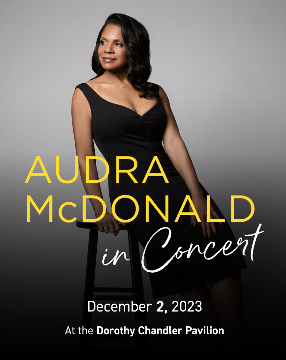A living musical theater legend at the peak of her vocal and interpretive powers
In the realm of musical theater, Audra McDonald stands as an unparalleled luminary. Possessing an extraordinary vocal prowess, an arresting stage presence, and an unrivaled artistic gift, she has etched her name as the preeminent diva within this art form. McDonald’s transcendent performances have enraptured global audiences, earning her an unprecedented six Tony Awards and the distinction of being the sole individual to triumph in all four acting categories. Her artistic range is nothing short of awe-inspiring, effortlessly navigating from ethereal ballads to commanding renditions of show-stopping numbers with a grace and precision that is truly remarkable. McDonald’s stagecraft leaves spectators in a state of profound admiration, as she breathes authenticity and depth into each character she embodies.
Having ardently followed McDonald’s career since 1999, when I first beheld her interpretative prowess in Michael John LaChiusa’s Marie Christine on Broadway, I have witnessed the maturation and refinement of her interpretative abilities over the years. With the passing of the legendary Barbara Cook in 2017, Audra McDonald now arguably stands as the foremost living interpreter of the American songbook.
The soirée at the Dorothy Chandler Pavilion on December 2, a near-sold-out affair, showcased McDonald in tandem with the full complement of the LA Opera Orchestra under the baton of her musical director, Andy Einhorn. Accompanying Einhorn were three virtuosic talents: Jeremy Jordan on piano, Gene Lewin on drums, and the seasoned bassist Mark Vanderpoel, all collaborators of McDonald’s for over a decade. Despite only one rehearsal, the LA Opera Orchestra adeptly navigated the evening, although an additional rehearsal or two might have elevated their performance to a higher echelon.
The orchestral overture commenced with the “Carousel Waltz” from Rodgers and Hammerstein’s Carousel, a nod to Audra’s unparalleled portrayal of Carrie Piperidge in the same production. Upon McDonald’s entrance, the audience erupted in fervor, a moment not lost on her, as she shared her childhood memories of watching the Oscars at the Dorothy Chandler Pavilion and marveled at the realization of her showbiz dreams on the same stage.
The inaugural piece, “I Am What I Am” from La Cage Aux Folles, saw Audra McDonald delivering a commanding rendition, imbuing the anthem with a poignant resonance for LGBTQ rights’”an issue dear to her heart. This theme of authentic self-expression in the face of societal othering echoed in Joe Raposo’s “It’s Not Easy Being Green.”
Each successive number showcased McDonald’s consummate artistry, holding the audience enthralled. In “Pure Imagination” from Willy Wonka and the Chocolate Factory, McDonald channeled the wide-eyed wonder of a child, compelling the audience to embrace their capacity for dreaming, pretending, playing, and envisioning the yet-unrealized.
The concert continued with “Before the Parade Passes By” from Jerry Herman’s Hello, Dolly!, conveying a fervent call to seize the moment, a sentiment reiterated in the non-theatrical composition “I Love Today” by singer-songwriter Kim Kalesti. Frank Loesser’s “Can’t Stop Talking About Him” showcased McDonald’s linguistic dexterity, while Duke Ellington’s “It Don’t Mean A Thing If It Ain’t Got That Swing” provided a rhythmic showcase for McDonald, her trio, and the orchestra.
A poignant tribute to Leontyne Price unfolded through the rendition of “I Could Have Danced All Night,” punctuated by an audience sing-along. McDonald paid homage to Price, referring to her as the “queen of Soprano Island.” The zenith of the performance materialized in McDonald’s unamplified rendition of George Gershwin’s “Summertime” from Porgy and Bess. Her operatic resonance effortlessly filled the cavernous hall, delivering a vocally flawless and emotionally poignant interpretation that left this reviewer contending with tears.
The repertoire delved into McDonald’s high school days with a go-for-broke interpretation of “Home” from The Wiz and the hilarious “Cornet Man” from Funny Girl, a song she won in a singing contest at the age of 14, despite not really understanding its risqué lyrics.
The evening featured a melancholic Leonard Bernstein medley merging “Some Other Time” from On the Town with “Somewhere” from West Side Story. Stephen Sondheim’s influence materialized in the combination of “Children Will Listen” from Into the Woods and “You’ve Got to Be Carefully Taught” from Rodgers and Hammerstein’s South Pacific. Sondheim was also featured in a heartbreaking mashup of “What Can You Lose” from the film Dick Tracy (sung in the movie by Madonna and Mandy Patinkin!) and “Not a Day Goes By” from Merrily We Roll Along.
The concert concluded with an avant-garde moody interpretation of Kander & Ebb’s “Cabaret,” a song that was literally “commanded” into McDonald’s repertoire by Anna Wintour for the Met Gala. Requested by Wintour to mark the end of the COVID epidemic, Audra made the song into a bittersweet celebration, urging a commitment to living life to the fullest despite the shadows of adversity.
As an encore, McDonald and Einhorn regaled the audience with a duet on Alger and Yellen’s 1929 standard “Happy Days Are Here Again.” Happy Days may not be here for many of us, but for fans of the American musical theater and the American song book, this was indeed a case of “Howdy gay times, Cloudy gray times. You are now a thing of the past.”
Audra McDonald in Concert
presented by LA Opera
Dorothy Chandler Pavilion in Los Angeles
reviewed on December 2, 2023
for future events, call 213.972.8001 or visit LA Opera
tour continues; for cities and dates, visit Audra McDonald

